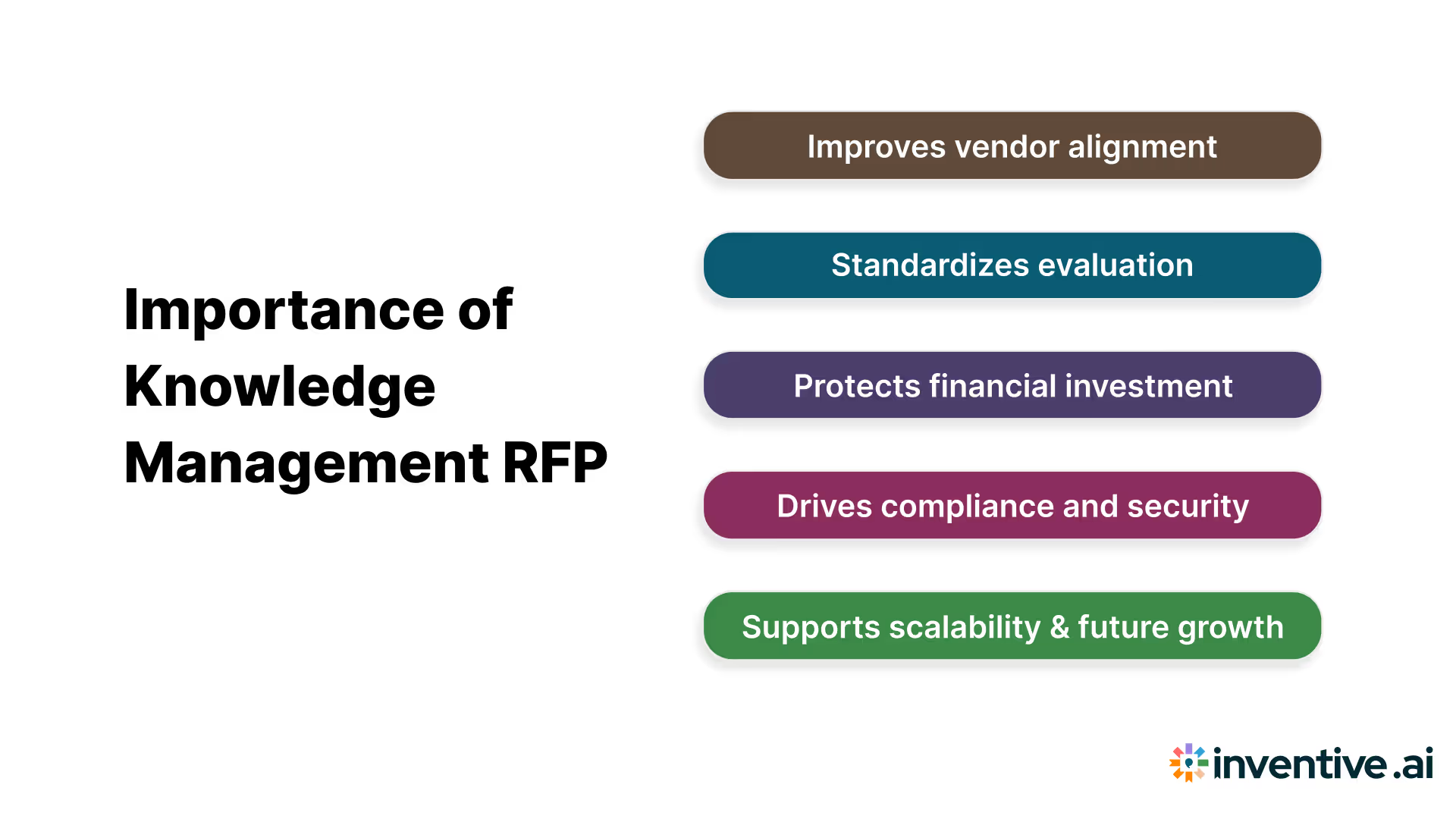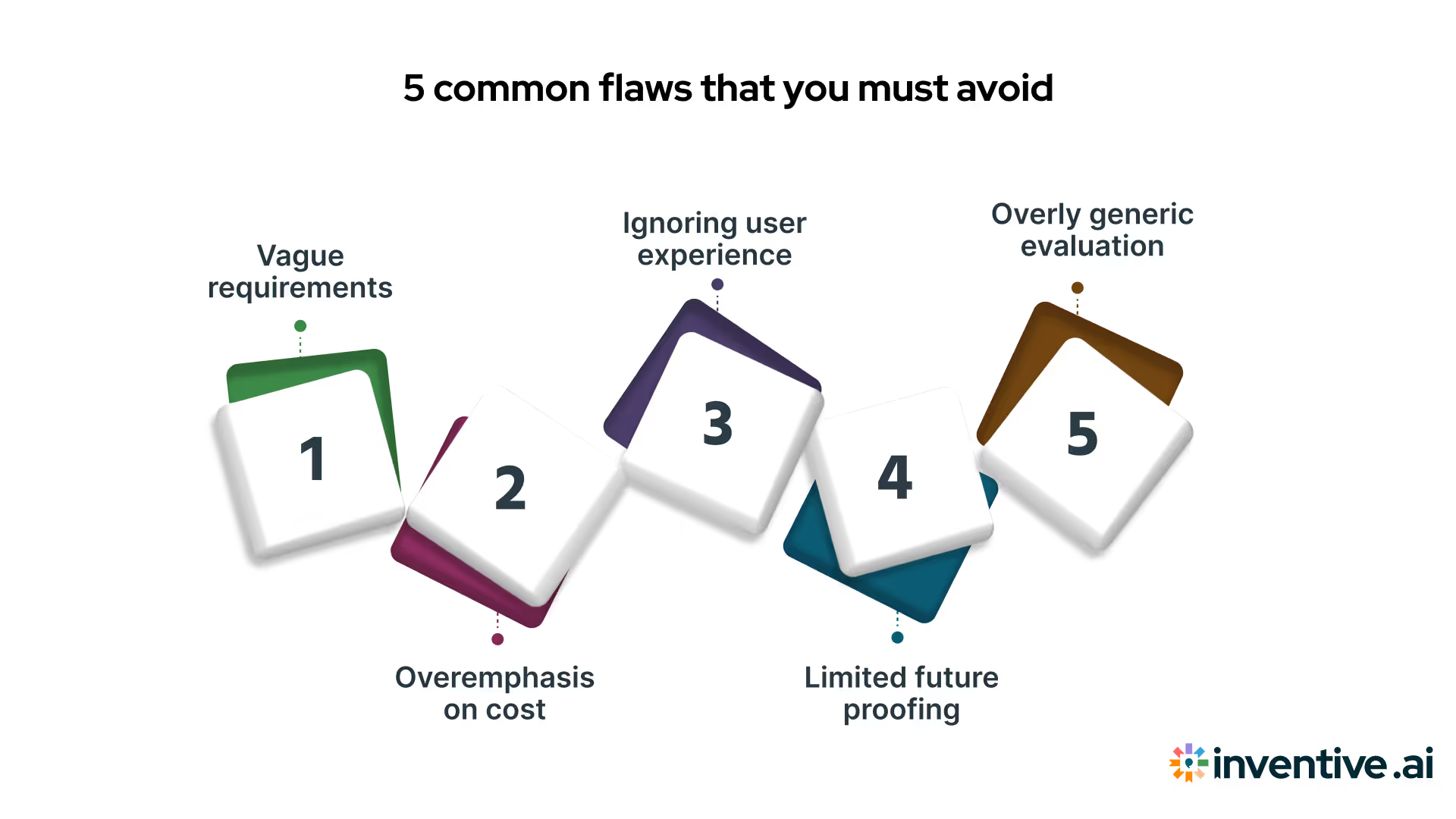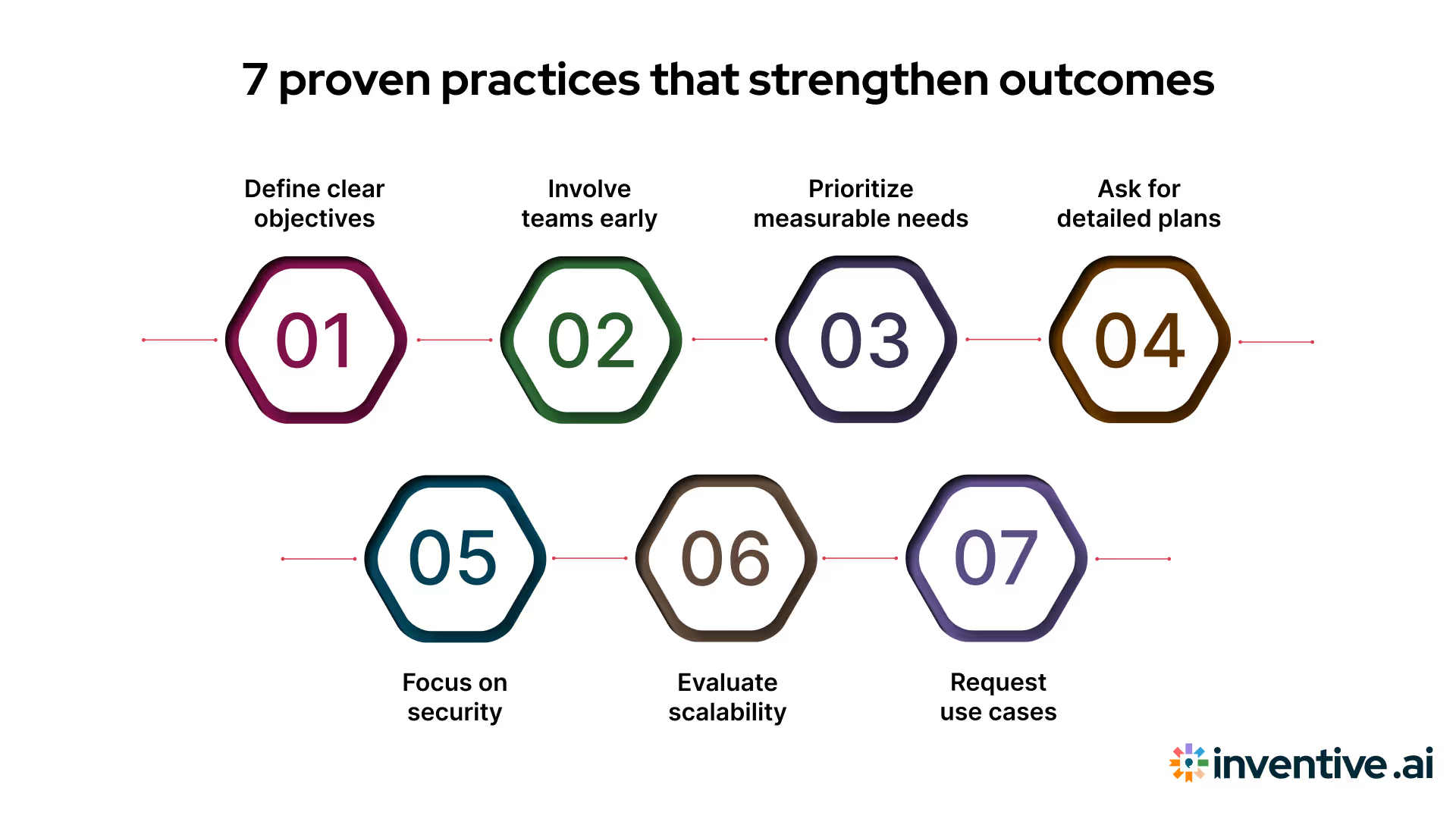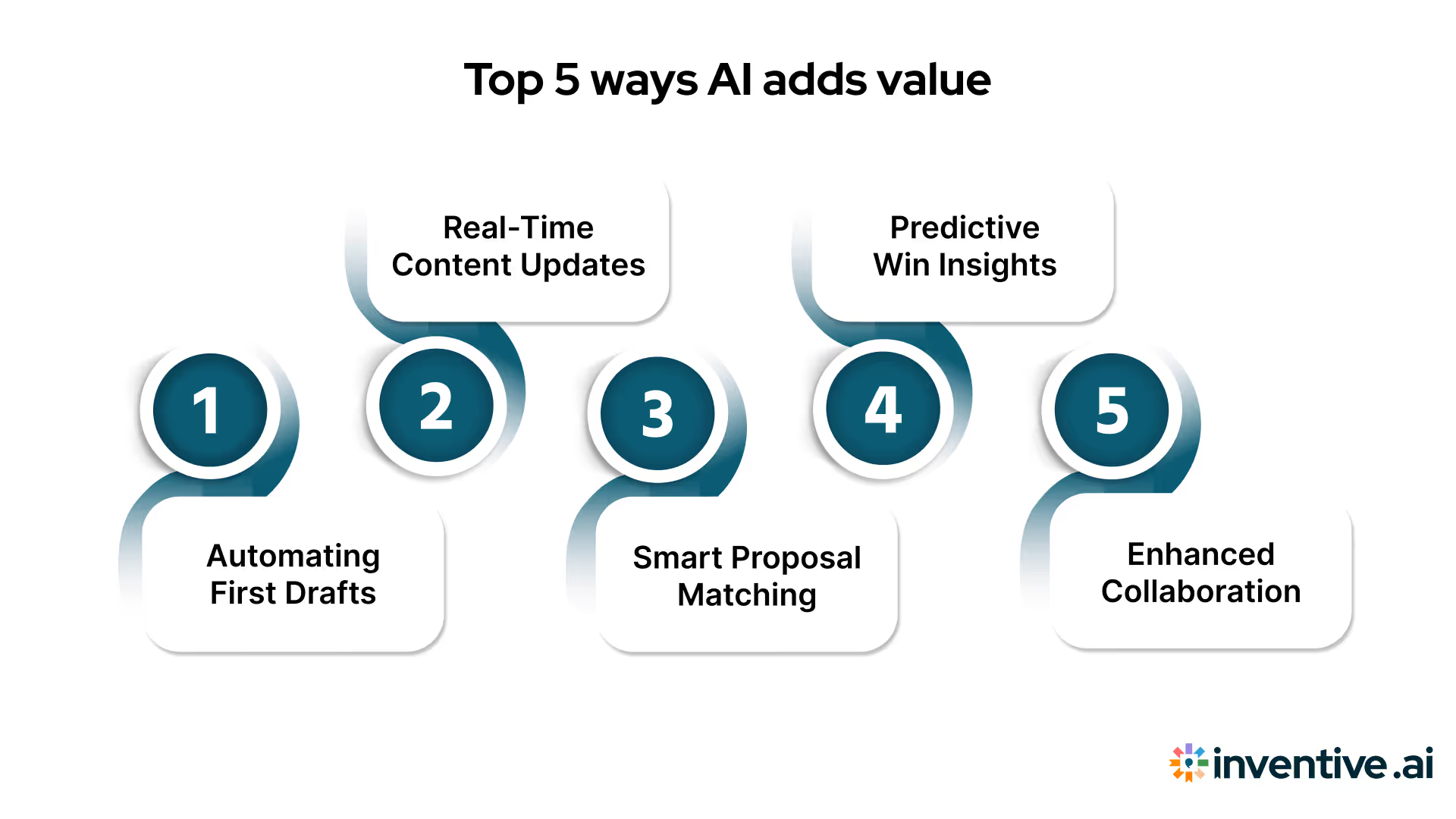Knowledge Management RFPs: Best Practices for 2026
Simplify your Knowledge Management RFP by standardizing workflows, capturing tacit knowledge, and utilizing the right technology. Click now for insights!

Are your knowledge management RFPs costing more time and money than they should?
When organizations lack a clear process, they create RFPs that fail to drive actual adoption, increase project risk, and waste valuable resources. In fact, Fortune 500 companies lose an estimated $31.5 billion annually due to ineffective knowledge sharing and scattered information.
A well-crafted knowledge management RFP ensures vendor responses truly match your needs while promoting user adoption, compliance, and long-term value.
In this guide, you will learn the most effective practices for crafting stronger knowledge management RFPs in 2026. You will also understand how to save time with AI, boost efficiency, and select platforms built to deliver results.
Key Takeaways
- A clear knowledge management RFP sets the foundation for efficient vendor evaluation.
- Defining scope, requirements, and evaluation criteria avoids confusion and speeds decision-making.
- Common flaws include vague requirements, ignoring integration, and lack of measurable outcomes.
- Best practices focus on clarity, collaboration, scalability, and long-term adaptability.
- AI-driven tools can enhance accuracy, speed, and competitiveness in knowledge management processes.
Why Knowledge Management RFPs Matter in 2026?

A knowledge management RFP is a structured document used to evaluate and select vendors that provide solutions for storing, sharing, and managing organizational knowledge. In 2026, these RFPs play an essential role in aligning technology with business needs, improving efficiency, and ensuring data-driven decision-making.
When done well, knowledge management delivers real results. According to IDC, 39% of organizations improved business execution, including faster time to market and better decision-making. Another 35% reported gains in employee performance, productivity, learning, and collaboration.
Here are a few point that shows the importance of knowledge management RFP in 2026:
- Improves vendor alignment: A knowledge management RFP ensures vendors understand your goals and requirements clearly. It reduces the risk of misinterpretation by setting clear expectations, technical specifications, and service levels. This structured approach helps organizations partner with vendors that are better suited to deliver long-term results.
Must read our Complete Guide to Vendor Selection Procedure Steps.
- Standardizes evaluation: With multiple vendors offering similar solutions, comparisons can become complex. An RFP standardizes the process by forcing vendors to respond to identical criteria. This makes it easier for decision-makers to score, compare, and justify selections based on facts, not subjective preferences.
- Protects financial investment: RFP Knowledge systems often require large investments in technology and support. A well-written RFP ensures cost transparency by requiring detailed pricing breakdowns. It also highlights hidden expenses like integration or training. This minimizes budget surprises and ensures financial accountability throughout the vendor relationship.
- Drives compliance and security: Data governance and security remain top concerns in 2026. A knowledge management RFP allows organizations to test vendor capabilities against compliance standards such as HIPAA, GDPR, or SOC 2. Mandating disclosures reduces the chance of regulatory risk and strengthens enterprise-wide data protection.
Must Read: AI Agents for Security Questionnaire Automation.
- Supports scalability and future growth: The business environment changes quickly, and solutions must adapt. Through an RFP, organizations can probe vendor readiness for AI, automation, and integrations. It ensures that knowledge platforms not only solve today’s needs but can expand as the organization grows without costly migrations.
A knowledge management RFP is more than procurement paperwork: it’s a strategic tool to secure alignment, protect budgets, and ensure scalability. By building stronger frameworks, businesses gain clarity and control, setting a foundation for long-term success.
But what sections can you include in your KM RFP? Let's find out next.
Key Sections to Include in Your Knowledge Management RFP
A well-structured RFP sets clear expectations and encourages vendors to deliver personalized, high-quality proposals. Including strategic, detailed sections supports vendor alignment and simplifies internal evaluation, helping organizations select the knowledge management solution that best fits their needs and goals.
Below are the essential sections every KM RFP should include to achieve consistency, transparency, and confidence in vendor selection:
- Company Overview & Project Goals:
Introduces the organization, its mission, and the primary objectives for implementing or upgrading the knowledge management system. This context helps vendors customize their responses to real business challenges. - Scope of Work and Detailed Requirements:
Outlines specific technical and business requirements, integration needs, desired features, and expected deliverables. Providing measurable and precise requirements ensures proposals are fully aligned with organizational needs. - Vendor Questions (Technical, Security, Support):
Presents structured questions on system architecture, compliance, security protocols, scalability, support processes, and vendor experience. These prompts enable direct, comparable answers and demonstrate vendor expertise. - Implementation, Training, and Onboarding Plan:
Requests a step-by-step rollout strategy, timeline, resource needs, and user enablement measures. Detailed plans help gauge whether vendors can guarantee smooth implementation, rapid adoption, and sustained usage. - Pricing Structure:
Asks vendors to present transparent, itemized costs, including licenses, services, integrations, and future scalability with explanations of pricing models and terms. - Submission Timeline and Guidelines:
Specifies proposal deadlines, required response formats, evaluation milestones, and criteria for follow-up. Clear timelines and guidelines keep the process efficient and on track.
Including these core sections minimizes risk and miscommunication while fostering a fair, objective selection process. Now, let’s understand the common pitfalls to avoid for a successful outcome.
Common Flaws in Knowledge Management RFPs

Even the most well-intended knowledge management RFP can fall short if not designed with precision. Many organizations unintentionally introduce gaps that weaken evaluations, prolong decision cycles, or limit their ability to select the right vendor.
Here are 5 common flaws that you must avoid:
- Vague requirements: When goals and specifications are unclear, vendors make assumptions. It often results in incomplete or misaligned proposals. To avoid this, define technical needs, integration requirements, and business outcomes with measurable details. Clear requirements improve proposal accuracy and eliminate back-and-forth clarifications.
Boost your RFP success rates with our AI-driven proposal guide for small businesses.
- Overemphasis on cost: Price is important, but should not be the only deciding factor. Over-prioritizing cost leads to selecting vendors that fall short on support, scalability, or security. A balanced evaluation matrix that assigns weight to functionality, experience, and compliance ensures more informed vendor selection.
- Ignoring user experience: Some RFPs focus solely on system capabilities while overlooking usability. Complex platforms may meet technical needs but frustrate end users. To prevent this, include usability metrics, training requirements, and user adoption strategies in the RFP. It guarantees long-term engagement with the chosen solution.
- Limited future-proofing: RFPs often capture present needs but miss long-term goals. Vendors may deliver a system that works today but fails in two years. Avoid this by asking about roadmaps, AI-readiness, and integrations. Future-proofing questions ensure the platform scales with changing business demands.
- Overly generic evaluation criteria: When scoring rubrics are too broad, decision-making becomes subjective. Generic criteria leave room for bias and lack accountability. Build precise evaluation frameworks with defined scoring weights. It ensures consistency across stakeholders and leads to vendor selections backed by objective assessments.
These flaws reduce the strategic value of an RFP and can compromise vendor alignment. By recognizing these pitfalls, businesses can move toward smarter approaches that deliver lasting value. The best way forward is to focus on proven practices that strengthen knowledge management RFPs from the start.
7 Best Practices for Knowledge Management RFPs in 2026
Avoiding flaws is only half the work. To make a knowledge management RFP effective, organizations need structured practices that ensure clarity, fairness, and long-term alignment with business goals.
Many are already leaning on AI for support. APQC reports that 38% of KM teams use AI to recommend content or knowledge assets. It shows the growing need for clear practices that balance technology use with business needs.
Here are 7 proven practices that strengthen outcomes:

1. Define clear business objectives
An RFP should not just ask for features; it should connect technology to business needs.
For example, if a bank wants faster onboarding, the RFP must request knowledge management tools that improve search accuracy and automate FAQs.
Clear objectives help vendors customize solutions instead of offering generic proposals.
2. Involve cross-functional teams early
Knowledge management impacts IT, compliance, operations, and customer support. When only one team writes the RFP, blind spots appear.
Involving multiple stakeholders ensures requirements reflect real use cases.
For instance, IT may focus on integration, while customer support highlights usability. With 31% using generative AI for content creation and 28% relying on AI-driven search (APQC), cross-functional input helps capture these evolving needs, creating a balanced and realistic RFP.
3. Prioritize measurable requirements
Instead of saying “the system should be fast,” specify performance expectations.
For example, “search results should load in under two seconds for 10,000 users.”
Measurable criteria reduce ambiguity and enable fair comparisons between vendors. When every requirement has a number, vendors compete on results rather than vague promises.
4. Ask for detailed implementation plans
Buying software is not enough; adoption depends on roll-out. RFPs that request clear implementation timelines, training schedules, and support structures set vendors apart.
For example, an RFP could ask: “Provide a 90-day onboarding plan with milestones.”
It ensures the chosen solution can be deployed without major delays.
5. Focus on security and compliance upfront
In 2026, data security remains a top concern. A knowledge management RFP should request details on encryption, data residency, and compliance with standards like SOC 2 or HIPAA.
Asking for documented proof instead of marketing claims ensures only vendors with robust protections make it to the shortlist.
6. Evaluate scalability and integrations
A solution that works today may not handle tomorrow’s growth. To prevent future issues, RFPs should ask about maximum user capacity, modular add-ons, and APIs.
For example, an insurance firm planning expansion may need smooth integration with Salesforce and Microsoft Teams. Scalability protects long-term investments.
7. Request use cases and customer success stories
Instead of relying on product demos alone, ask vendors to share real examples where their solution delivered measurable results.
For example, “Describe how your platform reduced knowledge retrieval time by 30% for an enterprise client.” It helps evaluators confirm whether claims translate into actual performance.
These practices transform a basic RFP into a strategic tool that reduces risks and improves vendor alignment. Strong RFPs attract better responses and make the evaluation more objective. Now, let's discuss some questions that buyers can consider asking.
Sample Questions to Ask Your KM Vendors
Effective vendor selection for Knowledge Management systems starts with asking the right questions. Strategic, focused inquiries reveal a vendor’s ability to meet technical, operational, and business needs specific to the RFP process. These questions go beyond features to state true alignment with your organization’s goals and challenges.
Below is a curated list of 10 essential questions to ask prospective KM vendors, each crafted with clear intent to guide your evaluation.
Using these targeted questions will help buyers objectively assess vendor capabilities and ensure alignment with their strategic RFP goals. A comprehensive evaluation forms the foundation for successful implementation and long-term user satisfaction.
To make them truly effective, organizations must also define strong criteria for measuring responses against business priorities.
Key Evaluation Criteria for Knowledge Management RFPs
Even a well-written knowledge management RFP needs solid evaluation methods. Clear criteria help decision-makers separate strong proposals from weak ones and avoid bias.
Here are a few important factors to assess every vendor:
- User Experience and Accessibility: A tool may have advanced features, but poor usability reduces adoption. Evaluators should assess how intuitive the interface is, whether mobile access is available, and how quickly new users can adapt. Ease of use often decides if employees embrace the platform or revert to old methods.
- Knowledge Search Accuracy: The real test of a knowledge management system is how well it retrieves answers. Evaluation should measure the precision of search results, the ability to filter by context, and support for natural language queries. High search accuracy means faster resolutions and reduced frustration across teams.
- Vendor Training and Ongoing Support: Technology alone cannot guarantee success. Vendors must offer structured onboarding, hands-on training, and continuous support. Evaluators should check service-level agreements, support availability, and learning resources. Strong vendor support ensures the organization can sustain usage and adapt to updates without heavy reliance on internal teams.
Also Read: Customer Support RFPs: 10 Essential Steps for a Winning Vendor Selection.
- Analytics and Reporting Capabilities: Knowledge management is valuable only when performance can be tracked. RFP responses should be judged on built-in analytics features like usage reports, search trends, and content gaps. Robust reporting enables leaders to measure adoption, identify weak areas, and justify the system’s return on investment.
- Cost Transparency and Flexibility: Pricing models can hide long-term costs. Evaluators should look for clear breakdowns of licensing, implementation, training, and add-ons. Flexible payment structures, such as per-user pricing or enterprise packages, should be compared. Transparent and adaptable pricing ensures budgets remain predictable while still accommodating future growth.
By applying these criteria, organizations can evaluate proposals with confidence and fairness. Strong assessment frameworks highlight the best-fit vendor and protect against costly mistakes. With evaluation covered, the focus now turns to how AI transforms the process.
How AI Can Help with Knowledge Management RFPs?

AI is reshaping how organizations approach the knowledge management RFP process. From drafting to evaluation, AI-driven tools increase speed, accuracy, and decision-making power.
Here are the top 5 ways AI adds value:
- Automating First Drafts: AI tools can quickly generate proposal drafts by pulling relevant content from past responses and knowledge bases. It reduces repetitive writing tasks, ensures consistency in tone, and accelerates turnaround times. Teams can focus more on customizing answers rather than building proposals from scratch.
- Real-Time Content Updates: AI content managers help eliminate stale knowledge by detecting outdated information and suggesting replacements. Automatic updates ensure that proposals always include the latest data, policies, and case studies. It prevents errors and maintains accuracy across every submitted response.
- Smart Proposal Matching: AI systems can analyze RFP requirements and instantly map them to the most relevant knowledge assets. It improves precision in responses, minimizes manual searching, and ensures alignment between buyer requests and vendor capabilities. The result is a more competitive and tailored proposal.
- Predictive Win Insights: AI can analyze past RFP outcomes to detect win themes that work best. By identifying patterns in buyer preferences, industry trends, and competitor strengths, AI guides writers to emphasize the most persuasive arguments. This predictive approach boosts win rates and helps position proposals more strategically.
- Enhanced Collaboration with AI Agents: AI agents act as digital assistants, helping teams manage deadlines, allocate tasks, and track progress. They can alert writers about gaps, suggest improvements, and even benchmark performance. It reduces project delays, enhances productivity, and ensures every RFP is submitted with maximum quality control.
AI turns a complex, manual knowledge management RFP process into a faster, data-driven workflow. It helps vendors respond with accuracy, relevance, and stronger positioning. Next, let’s discuss how Inventive AI brings these AI capabilities into action.
How Inventive AI Supports Knowledge Management RFPs?
Inventive AI is an advanced proposal management platform built to transform the way teams handle knowledge management RFPs. It combines automation, AI-driven intelligence, and secure integrations to reduce manual work and improve accuracy.
Designed for proposal writers, sales teams, and bid managers, Inventive AI fits organizations managing high-volume or complex RFP workflows. Its features directly address the challenges of fragmented knowledge, slow drafting, and inconsistent responses.
Here are the key features that make Inventive AI the right choice for RFP teams:
- Knowledge Hub: Inventive AI centralizes all proposal content in one knowledge hub. Teams no longer spend hours searching through past RFPs or shared drives. Instead, writers can instantly access reusable, approved content.
It ensures consistency, faster turnaround, and reliable knowledge access across departments. For knowledge management RFPs, it eliminates duplication and strengthens proposal accuracy.
- Content Ingestion & Integration: Our software integrates directly with platforms like Google Workspace, Microsoft 365, and web sources. The content updates automatically, without manual copy-pasting or file transfers.
Proposal teams always work with the latest data, documents, and case studies. For knowledge management RFPs, it ensures accurate and current information flows seamlessly into responses.
- Anti-Hallucination & Citations: Every AI-generated answer is cited, complete with source references and confidence ratings. It eliminates guesswork and builds trust in outputs.
Proposal teams can review citations and validate accuracy before submission. In knowledge management RFPs, where factual precision is essential, this feature ensures compliance and credibility with auditors and decision-makers.
- RFP Intelligence Agent: This feature automatically shreds and organizes incoming RFP documents. Instead of manually breaking down hundreds of requirements, the system categorizes and indexes them. Teams save time and avoid oversight. For knowledge management RFPs, the intelligence agent makes initial preparation faster, ensuring no requirement is missed in complex submissions.
- Auto-Generation & Editing: Inventive AI drafts answers within minutes using stored knowledge. Writers can refine and edit iteratively, reducing the time spent on first drafts. What usually takes days can be completed in hours.
In knowledge management RFPs, this helps teams respond faster while still maintaining personalization and accuracy.
- Customer Research Agent: Understanding buyers is important to personalizing proposals. Inventive AI’s customer research agent scans buyer information, digital presence, and market data.
It delivers actionable insights, allowing teams to craft more persuasive responses. In knowledge management RFPs, this adds depth to proposals by aligning them with buyer priorities.
- Team Collaboration: With built-in role assignments and review workflows, Inventive AI enhances collaboration. Proposal managers can assign sections, track progress, and ensure accountability across team members. Real-time reviews keep responses aligned and error-free.
For knowledge management RFPs, this ensures proposals move smoothly from draft to submission without communication breakdowns.
Inventive AI provides proposal teams with a powerful suite of tools to handle knowledge management RFPs. From centralizing content to AI-powered drafting and customer insights, it transforms slow, manual workflows into efficient, accurate processes.
Conclusion
Creating a successful knowledge management RFP in 2026 is about more than just compliance; it’s about building clarity, efficiency, and trust. By defining clear goals, aligning teams, and identifying the right tools, businesses can simplify the RFP journey. A well-structured approach saves time and improves decision-making.
Some best practices, such as centralizing knowledge, prioritizing security, using automation, and ensuring transparent evaluation criteria, play a crucial role. However, challenges like manual errors, outdated content, fragmented collaboration, and inconsistent responses often slow progress. Addressing these gaps with structured planning and AI-powered solutions gives teams a competitive edge.
A well-managed knowledge management RFP ensures better accuracy, faster responses, and stronger buyer alignment. With the right strategy and tools, organizations can improve collaboration, reduce risks, and achieve more consistent wins.
Frequently Asked Questions
1. How can effective knowledge management improve the RFP process?
Effective knowledge management centralizes approved, up-to-date responses in one accessible platform. It reduces time wasted searching for information, eliminates duplicate effort, and ensures consistent, accurate answers in every proposal. It also helps avoid errors caused by outdated or conflicting content, improving RFP quality and win rates.
2. What are the key features to look for in an RFP knowledge management system?
Look for centralized repositories with AI-powered search, version control, and tagging capabilities. Integration with existing tools like CRM and document platforms is essential for smooth workflows. The system should support content review cycles and offer collaboration features to make knowledge capture and reuse effortless.
3. How should RFP content be organized for maximum accessibility?
Organize content into modular, reusable answer blocks tagged by topic, product, audience, and relevance. Multi-dimensional tagging allows the same content to be found through different paths without duplication. This approach lets users quickly locate precise information by various search angles, speeding up response creation.
4. How to maintain the quality and relevance of RFP knowledge over time?
Implement clear ownership for content categories and schedule regular reviews. Use AI tools to flag outdated or conflicting answers automatically. Encourage teams to provide continuous feedback and update the knowledge base as new products evolve or customer needs change.
5. How can AI enhance knowledge management for RFPs?
AI improves retrieval accuracy through semantic search and personalized recommendations. It surfaces context-aware answers based on the specific RFP question and project history. AI also automates updating and content suggestions, reducing manual maintenance while ensuring responses are always fresh and targeted.

90% Faster RFPs. 50% More Wins. Watch a 2-Minute Demo.
Recognizing that complex RFPs demand deep technical context rather than just simple keyword matching, Vishakh co-founded Inventive AI to build a smarter, safer "RFP brain." A published author and researcher in deep learning from Stanford, he applies rigorous engineering standards to ensure that every automated response is not only instant but factually accurate and secure.
Tired of watching deal cycles stall due to manual questionnaire back-and-forth, Dhiren co-founded Inventive AI to turn the RFP process from a bottleneck into a revenue accelerator. With a track record of scaling enterprise startups to successful acquisition, he combines strategic sales experience with AI innovation to help revenue teams close deals 10x faster.


